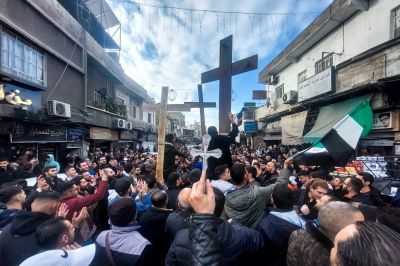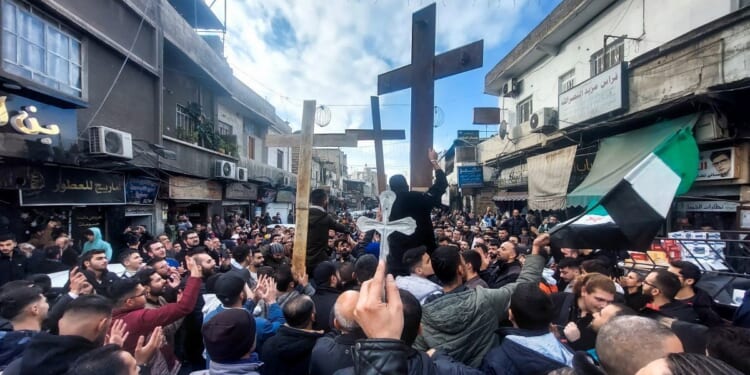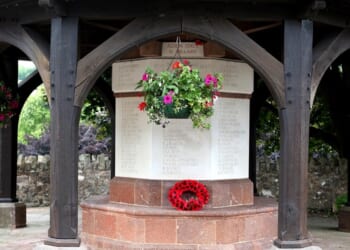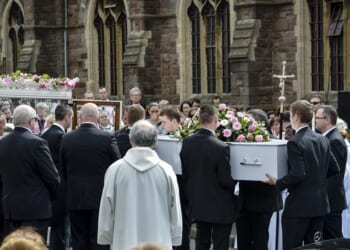
The back wall of Mar Elias Church in the Al-Douala neighborhood of Damascus, Syria, remains torn open, covered only by green mesh. Plywood conceals the blast crater on the sanctuary floor. Yet on that makeshift altar of ruin, someone has placed a single candle — a flickering sign that the church still lives.
On June 22, 2025, a man armed with a rifle, knives, and a suicide vest entered this parish during evening prayers. The massacre lasted less than a minute, but its impact will echo for generations.
Father Boutrous, the parish priest, remembers being thrown beneath rubble when the explosion tore through the sanctuary. “I thought I was dead,” he told me during my recent visit to Syria. “I felt peace, as if I were entering Heaven. Then I realized I was still breathing.”
When he pushed the debris away and stood, the scene before him defied comprehension — smoke, carnage, and an eerie silence. Then the cries of the wounded reached his ears. Children, parents, and elderly parishioners lay maimed and bleeding around him. Father Boutrous moved through the sanctuary, helping the wounded and blessing the dying.
For days afterward, he refused to let anyone scrub the blood from the church walls. “I smelled it like perfume,” he said, “because it was the blood of saints — the same ones we used to read about in books, except now they were in front of me, and I buried them with my own hands.”
The Mar Elias massacre is not an isolated tragedy but part of a wider erosion of Christianity in Syria. Before the war began in 2011, an estimated 2.2 million Christians lived in the country. Today, fewer than 500,000 remain, a decline of nearly 80 percent. Entire communities from Aleppo, Homs, and Raqqa have vanished. The violence follows a grim pattern seen in neighboring Iraq, where Christians dwindled after waves of targeted attacks in the 2000s. The fear is that Syria is on the same path.
The situation has grown more precarious since December 2024, when the militant Islamist faction Hayat Tahrir al-Sham (HTS) conquered Assad’s forces and took control of major Syrian cities. In March 2025, interim President Ahmed al-Sharaa signed a constitutional declaration, placing Syria under Islamic rule for a period of five years. While HTS initially promised not to enact radical religious policies, persecution against Christians and other minorities has intensified. Militants have attacked churches, desecrated cemeteries, forced Christian women to adhere to Islamic dress codes, and confiscated Christians’ homes.
For those who remain, daily life is survival amid bread shortages, displacement, and economic collapse. “We’re living just for today,” one survivor told me. “We don’t know about tomorrow.”
During my recent trip to Syria to see how survivors and the church were faring, what struck me most in these conversations was the refusal to answer violence with vengeance. Survivors spoke of hearing a voice during the attack: “Do not be afraid. I am with you.” Rima, who lost her 15-year-old daughter in the attack, insisted on forgiveness: “We pray for those who attack us. Our God is not a killer. We don’t want harm for anyone.”
Services at Mar Elias have resumed — two a week, soon to be three. Catechism classes and Sunday schools are back. Scouts gather. The church hall downstairs is cramped but filled to overflowing.
“They are not going to scare us, and they’re not going to make us leave,” Father Boutrous preached at the first mass after the bombing. “We want to stay and stand our ground even more than before. Because that is our faith.”
Global Christian Relief continues to stand in the gap and not forget those who are suffering for their faith. Through partnerships with local churches, relief projects, and support networks, we help Christians stay rooted in their homeland.
“The prayers of Christians around the world are what strengthen us,” Father Boutrous told me. “It means so very much when we know that a brother in Christ at the other end of the earth is remembering us.” One widow told me bluntly: “If we didn’t know Christians outside [of Syria] were supporting us, we would be devastated and destroyed.”
On my last day, I stood at the blast site as construction workers hammered in the background. The green tarpaulin fluttered where a wall had been. On the plywood covering the crater, the candle still burned.
The future of the church in Syria is uncertain. Once 10% of the nation, Christians are now less than three percent. Extremism, suspicion, and poverty press in. Yet amid the ruins, they keep lighting candles.
Before I left, Father Boutrous looked at me with eyes heavy but resolute. “We are still here,” he said. “And as long as there is even one candle, the church will live.”
Brian Orme is the CEO of Global Christian Relief, an organization that is focused on creating a movement of prayer and support for persecuted Christians worldwide.
















